By Arnon Shorr
THE STORY
Set in the shadows of the Spanish Inquisition, this is the coming-of-age story of José Alfaro, a young refugee who forms a powerful bond with the mysterious Pirate Captain Toledano. It’s a dynamic pirate adventure on the high seas, with hand-to-hand combat and ship-to-ship action, and the powerful story of a dark time in history when people took different paths to survive.
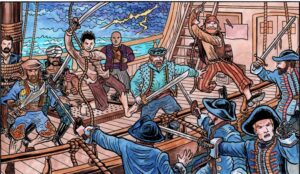
The Author
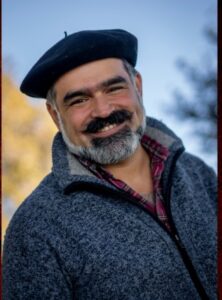
Arnon Z. Shorr is an author, screenwriter and filmmaker of character-driven adventures and thrillers, where heroes grapple with the extraordinary, and in doing so, learn important truths about themselves.
Arnon spent most of his childhood between worlds: a Hebrew speaker in America, a private school kid in a rented two-bedroom apartment. Whenever he’d set foot in one world, his other foot would betray him as different. For that reason, he tells stories that embrace the peculiar, where encounters with the unexpected reveal who we are.
The Artist
 Joshua Edelglass is a freelance illustrator from Massachusetts. He is also the Assistant director of Camp Ramah New England. At Brown University, Josh wrote and drew the political cartoon WorldView for The Brown Daily Herald. That experience gave him the bug for cartooning, a passion that has never left him.
Joshua Edelglass is a freelance illustrator from Massachusetts. He is also the Assistant director of Camp Ramah New England. At Brown University, Josh wrote and drew the political cartoon WorldView for The Brown Daily Herald. That experience gave him the bug for cartooning, a passion that has never left him.
Josh’s work has appeared in a variety of exhibitions, including Pow! Jewish Comics Art and Influence that ran at the Brooklyn Jewish Art Museum in Spring 2018. Josh was included in the Jewish Comix Anthology, published in 2014 by Alternative History Press. Josh was also included in SCI: The Jewish Comics Anthology vol. 2, which was published in the fall of 2018
DISCUSSION QUESTIONS & RELATED ACTIVITIES
EXPLORING THE STORY
- On page 5, the shopkeeper calls José “an over-educated freak”. Why do those words hurt Jose so much?
- On page 8, Papa Alfaro tells José that “to be holy… is to be different”.
- What do you think he means by this?
- José wants to be like everyone else – is there anything wrong with that?
- What makes you different? If you’re in a class or a group, try to share something about yourself that is true about only you, and not about anyone else in the group.
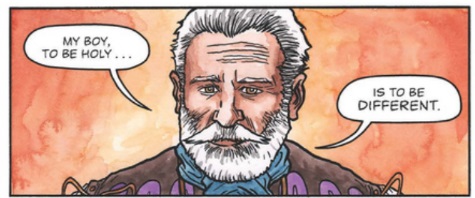
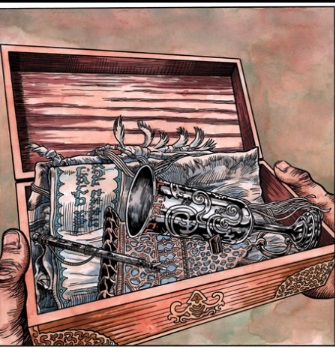
- What is Arawak? How many different languages does José speak?
- How many different languages can you speak?
- What is the value in learning different languages?
- On page 20, we see the box that José’s father kept under the floorboards of their house. In that box, he hides several important objects that he brought with him from when he had to flee Spain.
- What objects are in Papa Alfaro’s box?
- Why do you think he chose those objects?
- If you had to leave home and could only bring one small box with you, what would you put in it?
- Draw the objects you’d bring into the “empty box” image below.
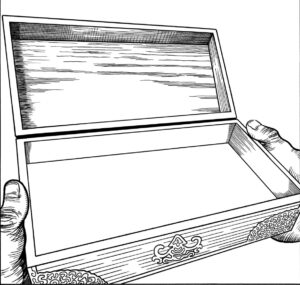 If you had to leave home and could only bring one small box with you, what would you put in it?
If you had to leave home and could only bring one small box with you, what would you put in it?
Draw the objects you’d bring into this empty box.
DISCUSSION QUESTIONS & RELATED ACTIVITIES
EXPLORING THE STORY
- On page 26, the Cacica tells José to “find your tribe.”
- What does she mean by that? What is she hoping Jose will do?
- By the end of the story, has José found his tribe? Who is in his tribe?
- Who is in your tribe? Who are the people you feel most connected to?
- On page 21 and again on page 67, certain Jewish mourning rituals are mentioned. What are these, and what do they mean?
- What positive and/or negative qualities do you see in the pirates of the Laqish?
- Would you want to be a pirate?
- How do Captain Toledano’s goals differ from those of most other pirates?
- What does Captain Toledano mean when he says on page 52 that “we plunder for something greater than gold”?
- Why hasn’t Captain Toledano revealed his Jewish heritage to his fellow pilots before now? How do you feel about that?
- Why does the Quartermaster betray Captain Toledano?
- What does Papa Alfaro mean when he exhorts Captain Toledano to show José their Jewish pride? What does Papa want Captain Toledano to do?
- Do you feel Jewish pride?
- How do you show your Jewish pride?
- How does Captain Toledano change after meeting Papa Alfaro?
- Can you explain the stalemate that Captain Toledano and the Quartermaster find themselves in on page 72?
- Why do the various pirates of the Laqish ally themselves with Captain Toledano and José on page 78?
- What Jewish ritual do captain Toledano and José do together at the end of the story?
- What is the significance of their doing that publicly, rather than in secret?
- The kiddush cup has travelled with José throughout the story. do you have any Jewish ritual objects in your family that have a special significance or history?
- What are the names of the different ships involved in the story? Can you discover the history of those names?
- If you were a pirate captain, what would you name your ship?
- On page 40, we see José learning some important pirate skills (while also studying Judaism with Captain Toledano). What skills does José learn? What important skills do you think José should learn next, if he really wants to be a pirate?
DISCUSSION QUESTIONS & RELATED ACTIVITIES
EXPLORING JEWISH HISTORY
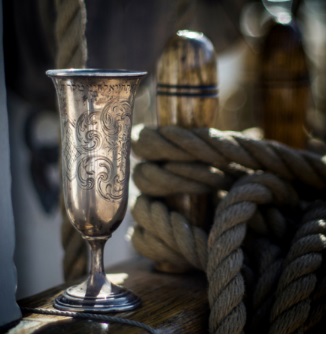
- When Arnon first wrote the short film, he included a kiddush cup as an important prop in the story. He was inspired to do this by a kiddush cup that once belonged to his great-great-grandfather.
- Creative Writing Prompt: Think of some part of your own heritage, whether it’s an object that was passed down through generations, or a photograph, or a story, or a melody, etc. Write a story in your favorite genre (sci-fi, western, mystery, romance, fantasy, etc.) that features something like that piece of your heritage.
- What is the Expulsion from Spain?
- What can you learn about what happened to the Jewish people after this traumatic event?
- What is the Spanish Inquisition?
- On page 67, Rosa says that “The Inquisition will end someday.” How long after the events of this story did it take for the Inquisition to end?
- The inquisition did not succeed in destroying Judaism completely. What are some of the ways in which Jewish families survived?
- On page 37, Captain Toledano speaks to José in Ladino. What can you learn about the history of this language?
- On page 39, we see a map of some of the places that Captain Toledano had visited.
- If you were telling a summary of your life story to someone, what are the major places you’d be sure to mention? These could be places where you’ve lived, or visited, or where something significant to you happened.
- Activity: Create a pirate map of your own, marking (with an “X”!) these important places!
- What are the names of the different ships involved in the story?
- Can you discover the history behind those names?
- If you were a pirate captain, what would you name your ship?
- On page 75, the Quartermaster calls Captain Toledano a Marrano. What does that word mean?
- Towards the end of the story, on page 78, many of the pirates on the Laqish share their stories about where they’re from, and what happened to their families.
- Can you list all of the places named in this scene on page 78? Can you find all of those places on a map or a globe?
DISCUSSION QUESTIONS & RELATED ACTIVITIES
EXPLORING JEWISH TEXTS
- On page 35, what Hebrew phrase catches Captain Toledano’s eye?
- On page 40, Captain Toledano speaks of “the unity of God.” What does this mean?
- To which line of Torah/t’fillah is Captain Toledano referring?
- On page 40, in the final panel on the page, what book of Tanakh is Captain Toledano holding?
- On page 41, José asks captain Toledano a difficult question: “If God knows everything, why does he let things like the Inquisition happen?”
- How does Captain Toledano answer this question?
- What is Maimonides” eleventh principle?
- How does Maimonides’ principle answer José’s question?
- Can we learn about other possible answers to José’s questions?
- On page 53, Captain Toledano refers to a “still, small, voice.” Do you know what Jewish text Captain Toledano is referencing there?
- It’s Kings 19. What can you learn about that story?
- What does the “still, small voice” mean in that story?
- How have other Jewish commentators expanded upon our understanding of that phrase?
- On page 53, Captain Toledano says: “Justice, Justice shall you pursue.”
- Where does that quotation come from?
- What does it mean?
- Who are people living today – famous or not – who you think are good examples of pursuing justice?
- What else can you do to pursue justice in your own life?
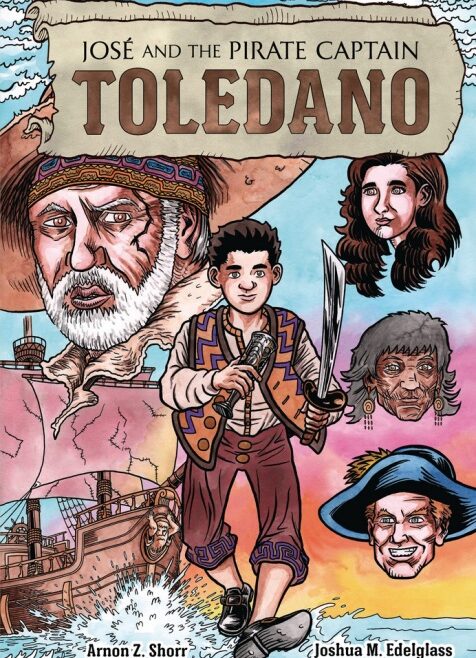

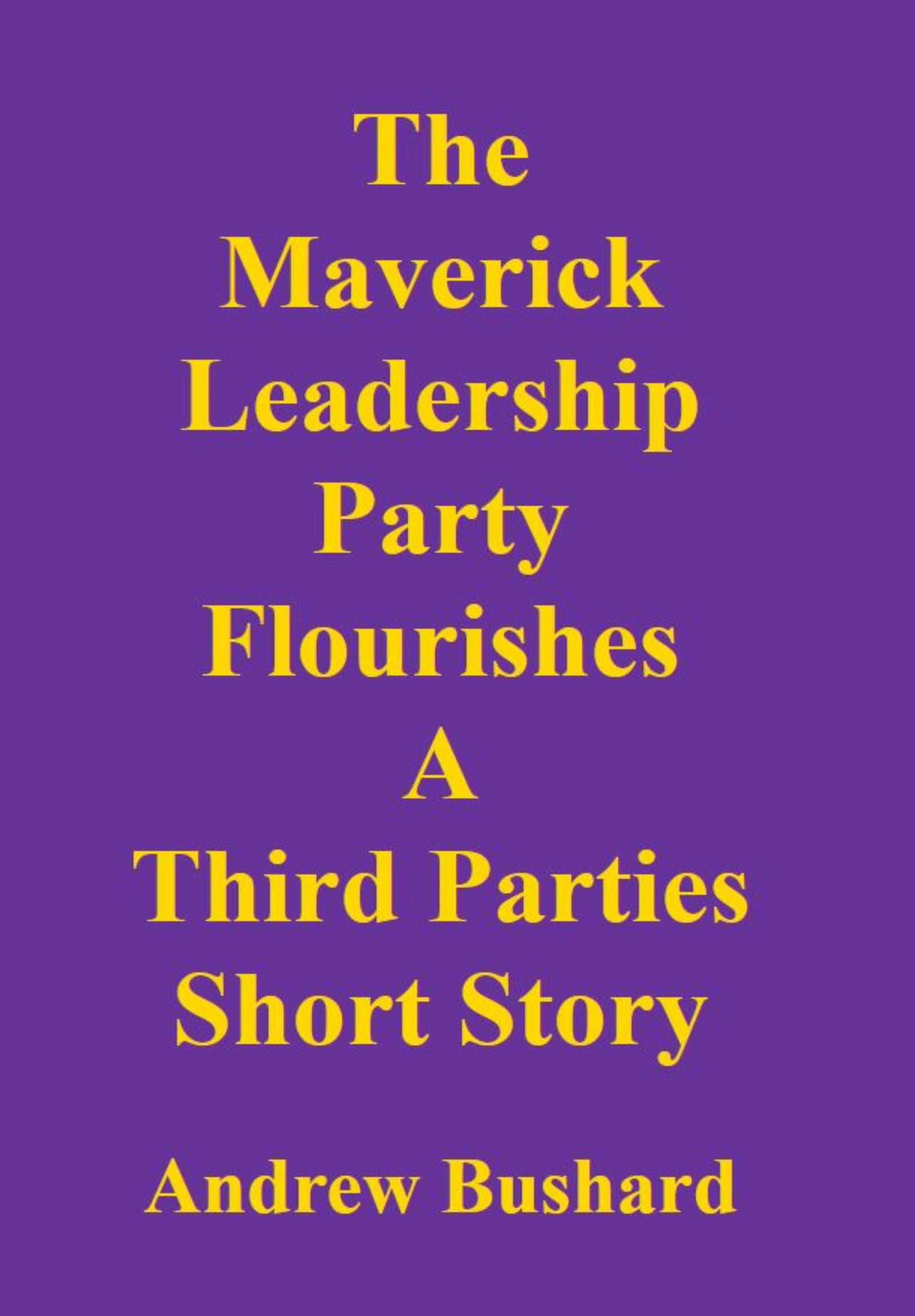

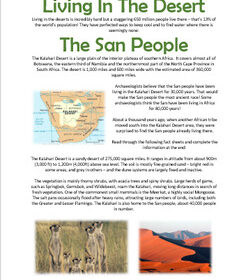
Write a Review
Leave a reply Cancel reply